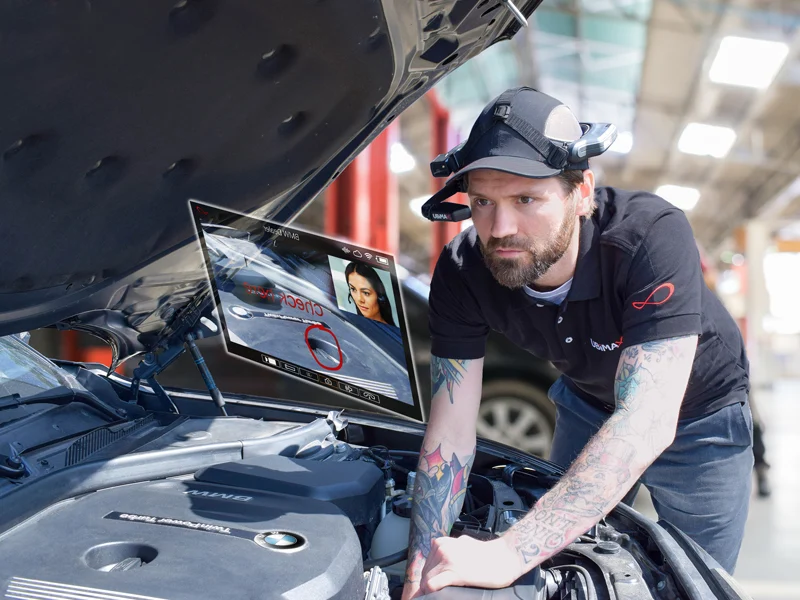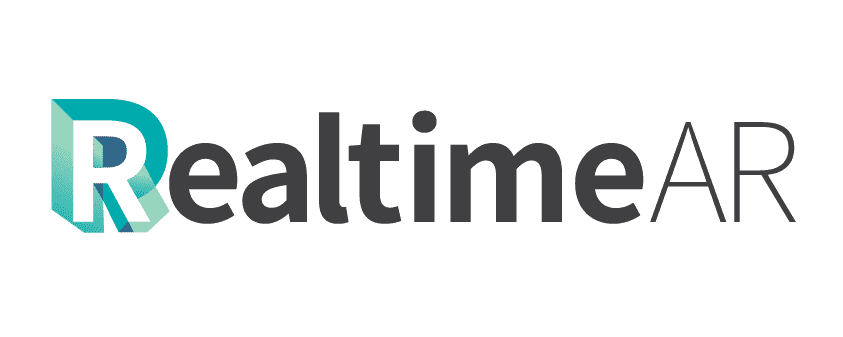DIGITAL TRANSFORMATION IN AUTOMOTIVE INDUSTRY VIA AR

Consumer experiences and operations in the automotive industry are transitioning from physical to digital. Automotive companies with a shared strategy of digital and physical are successful in transforming their business models and setting a new benchmark for competitors. Yet, many companies in the automotive sector are resistant to adapting to change because they miss out on the fact that digital is a new reality.
Assisted reality is one of the many solutions driving digital transformation in the automotive industry. World-renowned brands like Volkswagen, BMW and Ford have integrated assisted reality, such as RealWear’s HMT-1, to augment operational efficiency and empower workers.
Digital Transformation in the Automotive Industry
All we know is that automotive technology is in constant evolution. Companies in the sector are taking on their innovative roles by considering each step of their customer’s journey to provide the best customer service while improving employees’ productivity. We have already discussed that assisted reality solutions consisting of wearable computers have already penetrated due to their excellent capabilities; let’s discuss how they are driving digital transformation in the automotive industry.
Cost Efficiency
Cost efficiency is the ultimate goal for any organization in order to improve performance and accelerate profits. Assisted reality solutions are known for their cost efficiency as they connect workers with remote experts and enhance collaboration in real-time. RealWear’s HMT-1 is an industry leader that connects frontline workers to the expertise they require remotely to complete tasks with efficiency. As a result, it saves costs that incur when travelling from one facility to another and means a lesser skilled employee can carry out repair or maintenance tasks under the watchful eye of an expert. Ultimately, companies see return of investment and more through than many benefits of AR technology.
Time Efficiency
Digitalization in automotive sectors has streamlined processes that save time and increase workers’ productivity. Assisted reality solutions enable processes to take a leap and connect to people in multiple geographical locations in real-time, work hands-free with voice controls and technical documentation at their disposal. The main goal is getting cars back to customers as soon as possible. It not only saves valuable time for professionals and loyal customers of the automotive sector; AR devices also facilitate the process of knowledge transfer. The hours your training and development manager invests in preparing a honed professional can be done in less time via RealTime AR’s tech-based solutions.
Improved Productivity
AR technology also enables workers’ productivity for timely service delivery. Wearable computers, like the Navigator 500 or HMT-1, provide connected worker solutions that enable fleet workers and maintenance technicians in automotive maintenance to not only connect with a service manager remotely but also to connect with a customer to share any issues visually. This minimises the need for multiple visits and allows transparency with the customer.
Fewer Delays
Constant delays in your workshop can mean not meeting your profit margins. When a problem with an unknown solution arises, implementing AR technology means there is the option to minimize any delays and connect with your remote experts via head-mounted devices. These are voice-controlled, hands-free devices that let your workers initiate video calls with remote experts without a need for traditional hand-held devices, such as computers, tablets and mobile phones. Moreover, these devices also feature an industrial dashboard, which means you can use them at your own convenience. As a result, employees are able to complete their daily tasks on time without any physical disruptions, leading to fewer delays and meeting your KPI’s.
Here are the Companies that Led Digital Transformation in Automotive Industry
Organizations are constantly looking to integrate digitalization in the automotive sector to boost customer satisfaction and experience. Here are some industrial use cases by some of the top-class automotive businesses that include the deployment of assisted reality and Connected Worker Solutions.
Lexus
The integration of AR glasses enabled Lexus to support its dealerships. Now, the workers always have an efficient way to reach remote experts in the company’s headquarters in real-time and sort out technical problems. As a result, it eliminates the need for professionals to fly all the way to another facility and be present in person.
Volkswagen
The deployment of RealWear Connected Worker Solutions at Volkswagen has made communication easier than ever. Users of the technology can easily connect with experts to seek support for complex tasks via voice-controlled devices. It also allows remote experts to virtually see what a technician does in that moment, so they can virtually highlight problem areas and guide accordingly.
BMW North America
BMW North America rolled out RealWear HMT-1 devices integrated with Ubimax Frontline to raise service standards and shorten repair time. Not only did the company reduce repair time by 75 per cent, but it also boosted customer satisfaction.
The Bottom Line
In a nutshell, digital transformation in automotive industries has become a reality and reliance on physical assistance is a thing of the past. Assisted reality solutions are driving digitalisation in automotive sectors and should encourage more companies within this sector to think about implementing AR technology moving forward to give their service technicians the best tools to succeed in industry.

